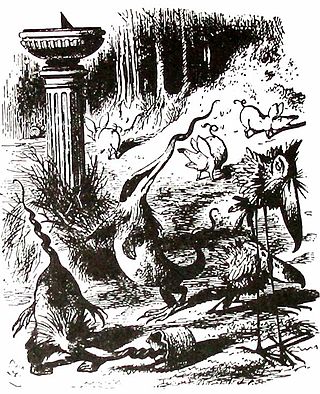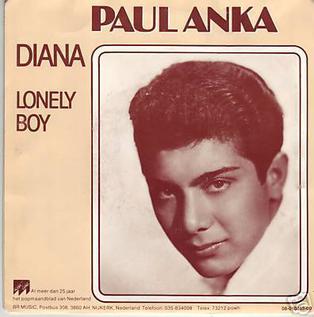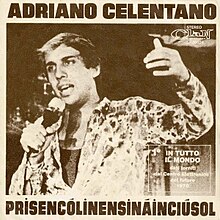Gibberish, also known as jibber-jabber or gobbledygook, is speech that is nonsense: ranging across speech sounds that are not actual words, pseudowords, language games and specialized jargon that seems nonsensical to outsiders.

Nonsense verse is a form of nonsense literature usually employing strong prosodic elements like rhythm and rhyme. It is often whimsical and humorous in tone and employs some of the techniques of nonsense literature.

Paul Albert Anka is a Canadian-American singer, songwriter and actor. He is best known for his signature hit songs including "Diana", "Lonely Boy", "Put Your Head on My Shoulder", and "(You're) Having My Baby". Anka also wrote the theme for The Tonight Show Starring Johnny Carson; one of Tom Jones' biggest hits, "She's a Lady"; and the English lyrics to Claude François and Jacques Revaux's music for Frank Sinatra's signature song "My Way", which has been recorded by many, including Elvis Presley. He co-wrote three songs with Michael Jackson: "This Is It" "Love Never Felt So Good", and "Don't Matter to Me", which became posthumous hits for Jackson in 2009, 2014, and 2018, respectively.

Salvatore "Toto" Cutugno was an Italian pop singer-songwriter, musician, and television presenter. He was best known for his worldwide hit song, "L'Italiano", released on his 1983 album of the same title. Cutugno also won the Eurovision Song Contest 1990 held in Zagreb, SFR Yugoslavia, with the song "Insieme: 1992", for which he wrote both the lyrics and music. He has been described as "one of the most popular singers in Italy and a symbol of Italian melody abroad", as well as "one of the most popular Italian performers on a global scale" and "one of the most successful Italian songwriters of all time", selling over 100 million records worldwide.

Adriano Celentano is an Italian singer-songwriter, actor, and filmmaker. He is dubbed Il Molleggiato because of his energetic dancing.
Animutation or fanimutation is a form of web-based computer animation, typically created in Adobe Flash and characterized by unpredictable montages of pop-culture images set to music, often in a language foreign to the intended viewers. It is not to be confused with manual collage animation, which predates the Internet.

Mina Anna Maria Mazzini or Mina Anna Quaini, known mononymously as Mina, is an Italian singer and actress. She was a staple of television variety shows and a dominant figure in Italian pop music from the 1960s to the mid-1970s, known for her three-octave vocal range, the agility of her soprano voice, and her image as an emancipated woman.

"It's Your Thing" is a funk single by The Isley Brothers. Released in 1969, the anthem was an artistic response to Motown chief Berry Gordy's demanding hold on his artists after the Isleys left the label in late 1968.
The expression Italian popular music refers to the musical output which is not usually considered academic or Classical music but rather has its roots in the popular traditions, and it may be defined in two ways: it can either be defined in terms of the current geographical location of the Italian Republic with the exceptions of the Germanic South Tyrol and the eastern portion of Friuli-Venezia Giulia; alternatively, it can be defined as the music produced by all those people who consider themselves as Italians and openly or implicitly refer to this belief. Both these two definitions are very loose: due to the complex political history of the Italian Peninsula and the different independent political states, cultural and linguistic traditions which sprang within them, it is rather difficult to define what may be considered to be truly Italian. Since before the formation of a unified educational system and the spread of information through the radio and the press during the 1920s, all the different cultural and linguistic groups within the country were independent of one another, and a unified Italian country was still only a political or ideological concept far from the daily life.

"Diana" is a song written and first performed by Paul Anka, who recorded it in May 1957 at Don Costa’s studio in New York City. Anka stated in his autobiography that the song was inspired by a girl named Diana Ayoub, whom he had met at his church and community events, and had developed a crush on. Session musicians on the record included George Barnes playing lead guitar, Bucky Pizzarelli playing the "Calypso" riff on guitar, Irving Wexler on piano, Jerry Bruno on bass, and Panama Francis on drums. The song was recorded in May 1957 at RCA Victor Studios in New York. Backup singers included Artie Ripp.

"Saturday in the Park" is a song written by Robert Lamm and recorded by the group Chicago for their 1972 album Chicago V. It was very successful upon release, reaching No. 3 on the Billboard Hot 100, and became the band's highest-charting single at the time, helping lift the album to No. 1. Billboard ranked it as the No. 76 song for 1972. The single was certified Gold by the RIAA, selling over 1,000,000 units in the U.S. alone.
Non-lexical vocables, which may be mixed with meaningful text, are a form of nonsense syllable used in a wide variety of music. Common English examples are "la la la", "na na na" and "da da da".

"Azzurro" is an Italian pop song composed by Paolo Conte and Vito Pallavicini. Its most famous version was recorded by Adriano Celentano in 1968.

"L'Italiano" is a pop song by Italian singer Toto Cutugno, released in 1983. It was his biggest international hit and is his best-known composition. Its popularity declined during the 1990s and was re-discovered when Cutugno performed it live at a charity concert in Rome commemorating Italy's victory at the 2006 FIFA World Cup, creating a new wave of popularity for the song.

Gino Santercole was an Italian singer-songwriter, guitarist, and actor. He was well known for his breakthrough hit "Questo vecchio pazzo mondo", a cover of P. F. Sloan's "Eve of Destruction", and for the song "Ma che freddo stasera " that he sang in the movie Yuppi du (1975).
A nonsense song is a type of song written mainly for the purpose of entertainment using nonsense syllables at least in the chorus. Such a song generally has a simple melody and a quick tempo and repeating sections.

"Il ragazzo della via Gluck" is an Italian pop song by Adriano Celentano, covered by artists from many other countries.
Michele "Miki" Del Prete is an Italian lyricist and record producer.

"Lift Yourself" is a song by American rapper Kanye West. West wrote the song alongside James Massie and Ben Winters, and produced it with additional production from Mike Dean. The song was debuted on April 27, 2018, through West's website and was released by GOOD Music and Def Jam three days later for digital download and streaming as a standalone single. As the first release of new music from West since his seventh studio album, The Life of Pablo (2016), it was perceived by numerous fans and publications to be him trolling them. The song samples Amnesty's "Liberty" and Dancer's "Boom Boom". Following a long build-up, West scats towards the end of the song, rapping nonsensical words.
"The Stroll" is a song written by Nancy Lee and Clyde Otis and performed by The Diamonds. It reached No. 1 on the Cashbox chart, #4 on the U.S. pop chart, and #5 on the U.S. R&B chart in 1958.














